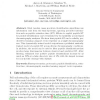Free Online Productivity Tools
i2Speak
i2Symbol
i2OCR
iTex2Img
iWeb2Print
iWeb2Shot
i2Type
iPdf2Split
iPdf2Merge
i2Bopomofo
i2Arabic
i2Style
i2Image
i2PDF
iLatex2Rtf
Sci2ools
RECOMB
2007
Springer
2007
Springer
Peptide Retention Time Prediction Yields Improved Tandem Mass Spectrum Identification for Diverse Chromatography Conditions
Most tandem mass spectrum identification algorithms use information only from the final spectrum, ignoring precursor information such as peptide retention time (RT). Efforts to exploit peptide RT for peptide identification can be frustrated by its variability across liquid chromatography analyses. We show that peptide RT can be reliably predicted by training a support vector regressor on a single chromatography run. This dynamically trained model outperforms a published statically trained model of peptide RT across diverse chromatography conditions. In addition, the model can be used to filter peptide identifications that produce large discrepancies between observed and predicted RT. After filtering, estimated true positive peptide identifications increase by as much as 50% at a false discovery rate of 3%, with the largest increase for non-specific cleavage with elastase.
Computational Biology | False Discovery Rate | Most Tandem Mass | RECOMB 2007 | Support Vector Regressor |
| Added | 03 Dec 2009 |
| Updated | 03 Dec 2009 |
| Type | Conference |
| Year | 2007 |
| Where | RECOMB |
| Authors | Aaron A. Klammer, Xianhua Yi, Michael J. MacCoss, William Stafford Noble |
Comments (0)

